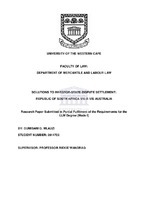| dc.contributor.advisor | Wandrag, Riekie | |
| dc.contributor.author | Mlauzi, Dumisani G. | |
| dc.date.accessioned | 2017-08-02T12:31:49Z | |
| dc.date.available | 2017-08-02T12:31:49Z | |
| dc.date.issued | 2016 | |
| dc.identifier.uri | http://hdl.handle.net/11394/5520 | |
| dc.description | Magister Legum - LLM | en_US |
| dc.description.abstract | The main objective of this paper is to critically analyse the solutions that countries are currently implementing in response to the much-debated issue that the conventional investor-state dispute settlement (ISDS) regime limits a host-state's space to make regulations under public policy. Consequently, the paper makes recommendations on viable solutions that countries can implement as solutions to the ISDS problems. In order to conduct the study, this paper uses the solutions to ISDS problems that have been implemented by the Republic of South Africa (RSA) and Australia respectively. The paper also compares the solutions implemented by RSA and Australia with some internationally recognised solutions. Chapters two and three of the paper discuss the backgrounds and also analyse the solutions to ISDS that have been implemented by RSA and Australia respectively. Chapter four contains the main findings and arguments of the paper. It analyses the strengths and weaknesses of the ISDS solutions that have been implemented by RSA and Australia respectively. One of the main findings of the paper is that retaining the conventional ISDS regime is less beneficial to developing and least developed countries and more beneficial to developed countries, largely due to the differing levels of outward investments that are present in these categories of countries. The paper recommends, inter alia, that, unlike developed countries, developing countries and least-developed countries should abrogate the conventional ISDS regime and only retain it in particular circumstances as explained in chapter five. The paper recommends that ISDS should only be utilised where state-state arbitration would unnecessarily politicise an investment dispute. The paper also finds the use of domestic court as undesirable to investment disputes. The paper recommends mediation as a more balanced avenue for resolving investment disputes. | en_US |
| dc.language.iso | en | en_US |
| dc.publisher | University of the Western Cape | en_US |
| dc.subject | Bilateral investment treaties | en_US |
| dc.subject | Investment disputes | en_US |
| dc.subject | Investor-State dispute settlement | en_US |
| dc.subject | Treaty-by-treaty approach | en_US |
| dc.subject | State-State arbitration | en_US |
| dc.subject | South Africa | en_US |
| dc.subject | Australia | en_US |
| dc.subject | South Africa. Protection of Investments Act, 2015 | en_US |
| dc.subject | International Centre for Settlement of Investment Disputes | en_US |
| dc.title | Solutions to investor-state dispute settlement : Republic of South Africa vis-à-vis Australia | en_US |
| dc.type | Thesis | en_US |
| dc.rights.holder | University of the Western Cape | en_US |

